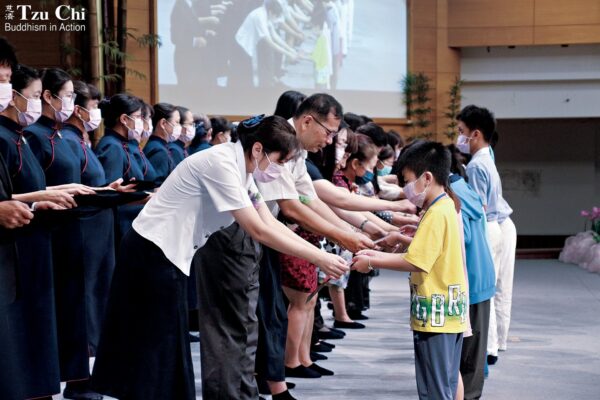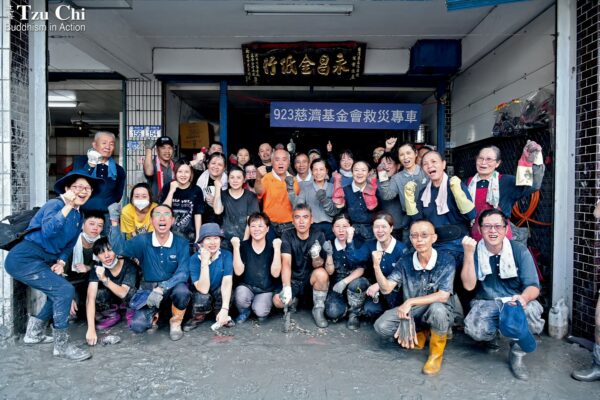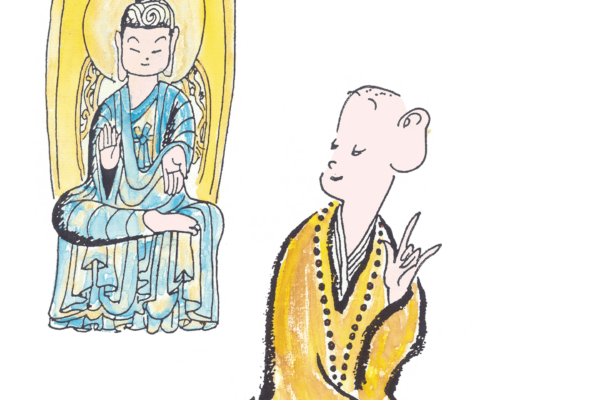By Wu Shu Chen
Translated by Wu Hsiao-ting
Photos by Pinticha Jansuksri
The economy or public safety: which comes first? Though the Thai government has effectively brought the pandemic under control with lockdown measures, the country’s economy has suffered as a result. How have Tzu Chi volunteers in Thailand responded to the pandemic and its effects?
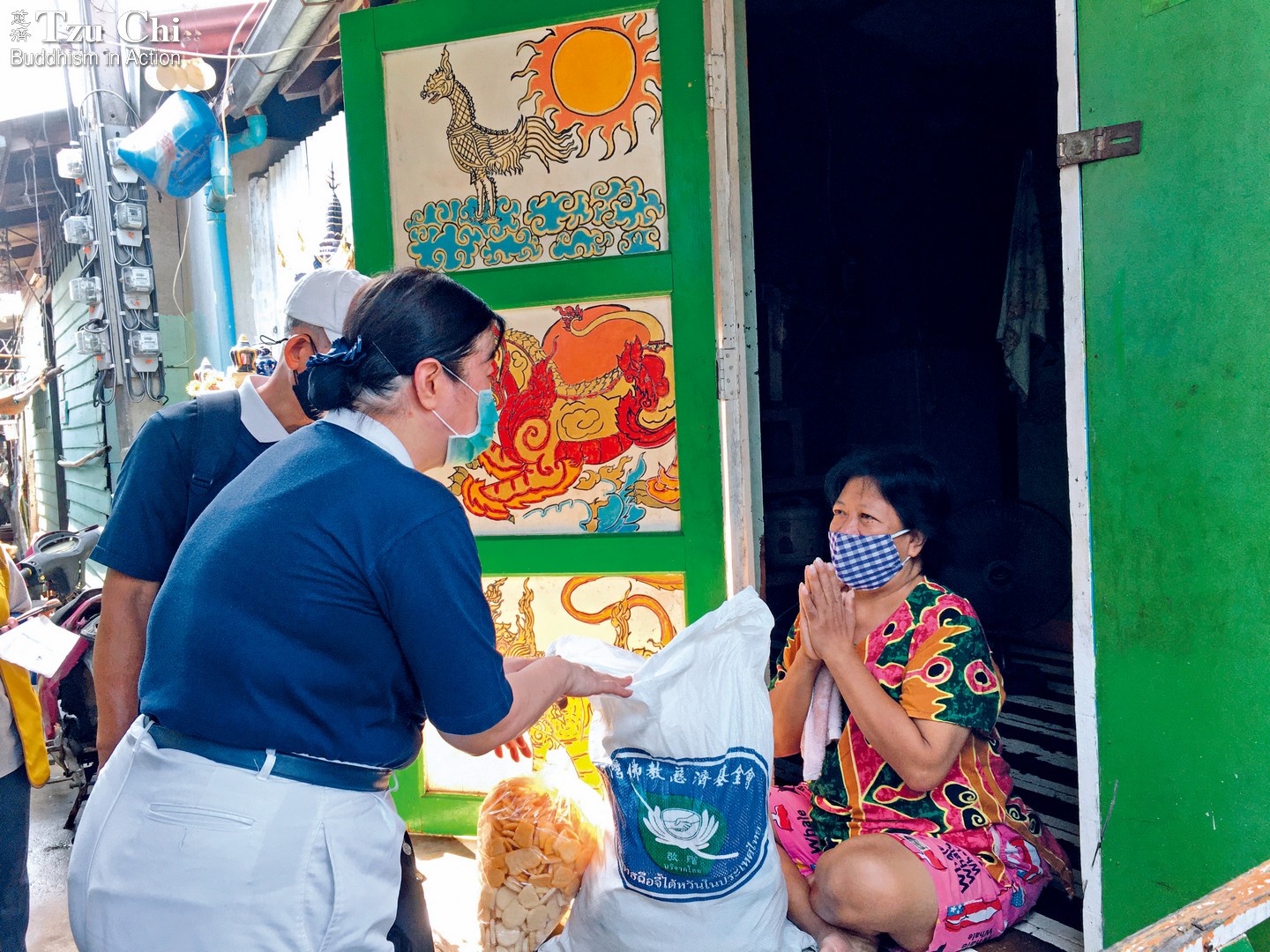
On April 26, volunteers visited household after household in Khlong Toei, Bangkok’s largest slum, to distribute aid and evaluate if the recipient families would need further support from Tzu Chi. DATCHANEE SURATEP
Thailand recorded its first confirmed coronavirus case on January 13, making it the first country outside of China to detect an infection. This should not be too surprising, given that tourism is a major industry in Thailand, and though the nation attracts tourists from around the world, Chinese tourists are the largest group among foreign visitors.
Though Thailand was the first country outside of China to register an infection, the number of cases remained low there throughout the earlier days of the outbreak. That initial spike in infections was avoided because of the country’s preliminary efforts in dealing with the virus. As early as January 3, just four days after China reported the new virus to the World Health Organization, the Thai government instituted precautionary measures to protect themselves from the disease. For example, visitors from China were screened at four international airports, and patients diagnosed with the virus were quickly isolated for treatment.
But even with these early precautionary measures, the Thai government and the private sector weren’t on a high enough alert for COVID-19. Instead of enforcing tight border control measures to prevent the spread of the coronavirus, the Thai government continued to keep its doors wide open to Chinese tourists. Why was this? One reason was that tourism plays such an important role in Thailand, both in terms of the GDP and the number of jobs. Another reason was that, unlike Taiwan, Thailand had been almost untouched by the SARS epidemic back in 2003. The country hadn’t been preparing for another disease outbreak, so when it came to making a choice between the economy and public health, the balance tipped toward the former.
In early March, the South Korean government asked Thais working illegally in the nation to return to their home country because the COVID-19 situation had been escalating in South Korea. Over 15,000 illegal workers returned to Thailand as a result, which began to trigger some alarm and fear of the disease. But even then, when many other countries were imposing a 14-day quarantine on incoming travelers, the Thai government continued to waver in its quarantine decisions, yielding again to economic interests. The indecision eventually led to several cluster infections, with the number of confirmed cases increasing rapidly in March, from single digits a day to over a hundred new cases a day.
On March 16, for the first time in Thai history, Thailand’s Ministry of Public Health cancelled Songkran, the Thai New Year, and related celebrations to reduce the risk of the coronavirus spreading. All schools nationwide were ordered to close, as were public venues and businesses in Bangkok and several other provinces. On March 25, Prime Minister Prayut Chan-o-cha declared a state of emergency effective the next day. Lockdown measures were instituted in varying degrees throughout the country; all commercial international flights were suspended in early April; and checkpoints were set up in Bangkok and other provinces to screen inter-provincial travelers for symptoms of Covid-19. A ban was even imposed on the sale of alcoholic beverages to curb irresponsible socializing. As a result of these efforts, the number of new cases was finally brought under control, and continued to drop throughout April.
The cancellation of Songkran, also known as the Water Festival, was unprecedented in Thailand. People inevitably felt disappointed. But the impact of that decision paled in comparison to that caused by the government’s overall lockdown measures. These measures were like a double-edged sword. While they were effective in containing the outbreak, they also closed businesses and suspended jobs, which greatly strained many people’s financial situations.
Thailand experiences fewer natural disasters than other Southeast Asian countries. Though flooding occasionally hits the country during monsoon season, the impact of such events is manageable. The nation is self-sufficient in terms of food production, and because most people practice Buddhism, a general spirit of optimism reigns in the country. People there often wear a smile, winning the nation the nickname “the Kingdom of Smiles.” Even so, Thailand’s economy has witnessed a decline over the last several years. The government’s slow response to the threat of COVID-19 might have partly been triggered by the fear that preventive measures against the pandemic might cause the economy to further worsen. How will the kingdom emerge from the outbreak? Will it lose some of its smiles?
When there is a will, there is a way
Bangkok is the national capital of Thailand, and one of the economic centers of Southeast Asia. People from all over the country come to the metropolis to seek better opportunities. Some of these people are day laborers, and even if they don’t belong in a low-income category, a day without work means a day without pay for them. They are among those badly affected by the measures adopted to alleviate the pandemic.
Seeing their need, Tzu Chi volunteers in Thailand sprang into action to help. In addition to continuous care for families receiving regular aid from the foundation, volunteers decided to distribute daily necessities to people whose lives had been rendered difficult by the pandemic but who hadn’t been placed on the government’s aid list. Tzu Chi launched a relief project intended to last three months, during which they would distribute 30,000 packages of daily goods. Each package contained rice, crackers, cooking oil, sugar, salt, and vegetable and fruit juice—enough to last a family of four for at least two weeks.
The logistics of such a large undertaking were daunting. How could those most in need of Tzu Chi’s aid be identified? And would there be enough manpower and resources to carry out such a large project? At the time, people in Bangkok were panic buying, and even people who had money couldn’t necessarily buy the things they needed. Sukanya Rimphanawet (林純鈴), CEO of Tzu Chi Thailand, had difficulty falling asleep for several nights in a row thinking of the difficulties lying ahead. She even considered scaling back the aid project to make things less difficult. But she knew that a lot of people needed help, and as Tzu Chi volunteers, they should do their best to reach out to those in need instead of allowing themselves to be deterred by difficulties. She received a lot of encouragement when she reported on the project in a video conference with Tzu Chi headquarters in Taiwan. The meeting boosted her confidence, so she decided to just go for it.
On that very same day, Lin held another video conference with Tung Chen-yuan (童振源), who was the representative of the Taipei Economic and Cultural Office in Thailand at the time. After Lin explained to Tung about the charity program Tzu Chi Thailand was going to implement in response to the pandemic, he promised his backing. Immediately afterwards, two general managers of Taiwanese conglomerates in Thailand phoned Lin, one after the other, and offered help for the program. The news that Tzu Chi was soliciting donations to help people affected by the COVID-19 outbreak spread throughout different sectors of society, and the goods to be distributed were quickly purchased and prepared for distribution.
During this time, several volunteers from the Thai Ministry of Social Development and Human Security happened to be attending courses at the Tzu Chi Thailand office in Bangkok. When they learned of Tzu Chi’s distribution project, they helped the foundation obtain lists of people needing aid. Volunteers followed up by confirming and double-checking those on the lists to ensure that Tzu Chi’s aid was going to those who really needed it.
On an April afternoon, 200 volunteers gathered at the Tzu Chi office to pack the aid supplies. A curfew instituted by the government had gone into effect on April 3. It forbade people from leaving their houses between 10:00 p.m. and 4:00 a.m. Therefore, all goods had to be delivered to the distribution venues before ten at night. The IT personnel at the Tzu Chi office worked overtime to produce distribution claim slips with QR codes. This was to avoid the use of paper and pens at the distributions and thus reduce the possibility of close-range contact.
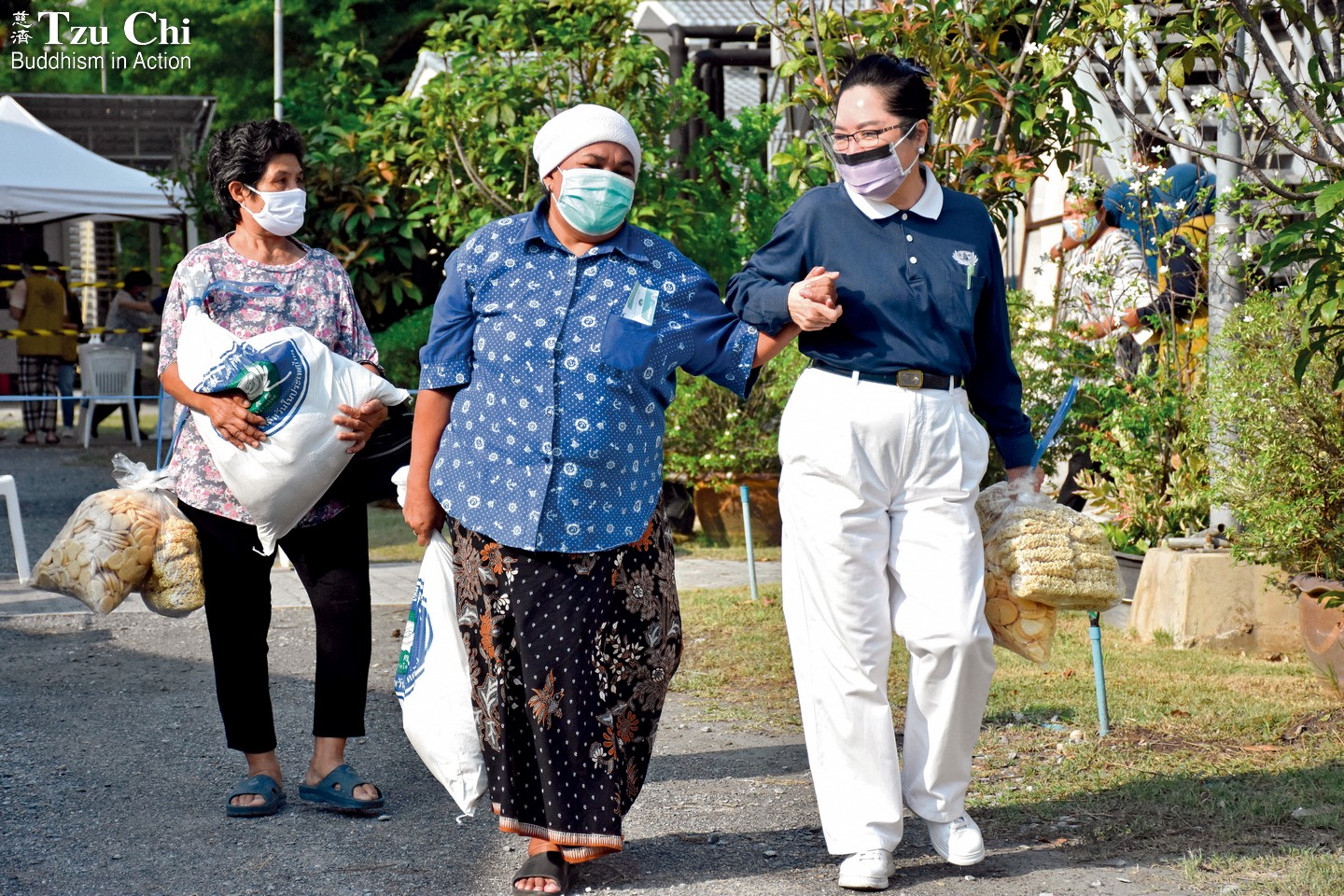
A volunteer accompanies an aid recipient for a time on her way home after the latter received her relief items from Tzu Chi.
The distributions
The first distribution took place on April 23 in Ratchaburi Province. More distributions soon followed. One was held in Nong Chok District, Bangkok, on April 25. It took place in an open-air space at Bangkok Arena, a venue designated by the government. Aid recipients came from seven communities, arriving at the arena at different times, in accordance with the time slots for which they had signed up to claim their goods. The staggered arrivals helped minimize the crowd and reduce the chance of disease transmission.
On April 26, volunteers delivered goods to household after household in Khlong Toei District, known for its slum. They made the door-to-door distribution to avoid the gathering of crowds. They also used the opportunity to further learn about the situation of each family and if they would need long-term care from Tzu Chi.
One of the aid recipients said to visiting volunteers, “My family is running out of rice. The supplies you gave us can help us save what money we have left. This is really a great help for us.” Wipas, a motorbike taxi driver, said, “I used to make 500 to 700 baht [16 to 22 U.S. dollars] a day, but business has dropped sharply due to the pandemic, making life difficult for me. I know this is a crisis and we must do our best to pull through, but thanks to Tzu Chi for easing my financial burden.”
Tzu Chi volunteers started visiting out-of-the-way rural communities in mid-May to distribute aid. They held four distributions in Bang Kruai District, Nonthaburi Province, on May 13, and another five there on May 26. At the same time, they began making purchases for people who had lost their jobs and had returned to their hometowns in Fang District, Chiang Mai Province. Volunteers also donated personal protective equipment to medical facilities. They donated surgical masks and protective gowns to six medical facilities on April 27 alone. Volunteers also launched a program to promote vegetarianism, providing 200 vegetarian boxed meals each day to people living near the Tzu Chi office.
No matter which district volunteers visited to distribute the daily necessity packages, hordes of loving people showed up to help. They assisted older people and women in obtaining and carrying their supplies, directed traffic, and maintained order. April is the hottest month in Thailand, and the packages distributed by Tzu Chi were heavy. Everyone’s clothes were soaked, but people who had come to help still said to Tzu Chi volunteers that they were thrilled to be able to contribute. The warm-heartedness of the Thai people manifested itself again and again through such kind gestures of help. Working together, everyone hoped to help pull the underserved through this difficult time. (Information provided by Budsara Sombut and Datchanee Suratep)
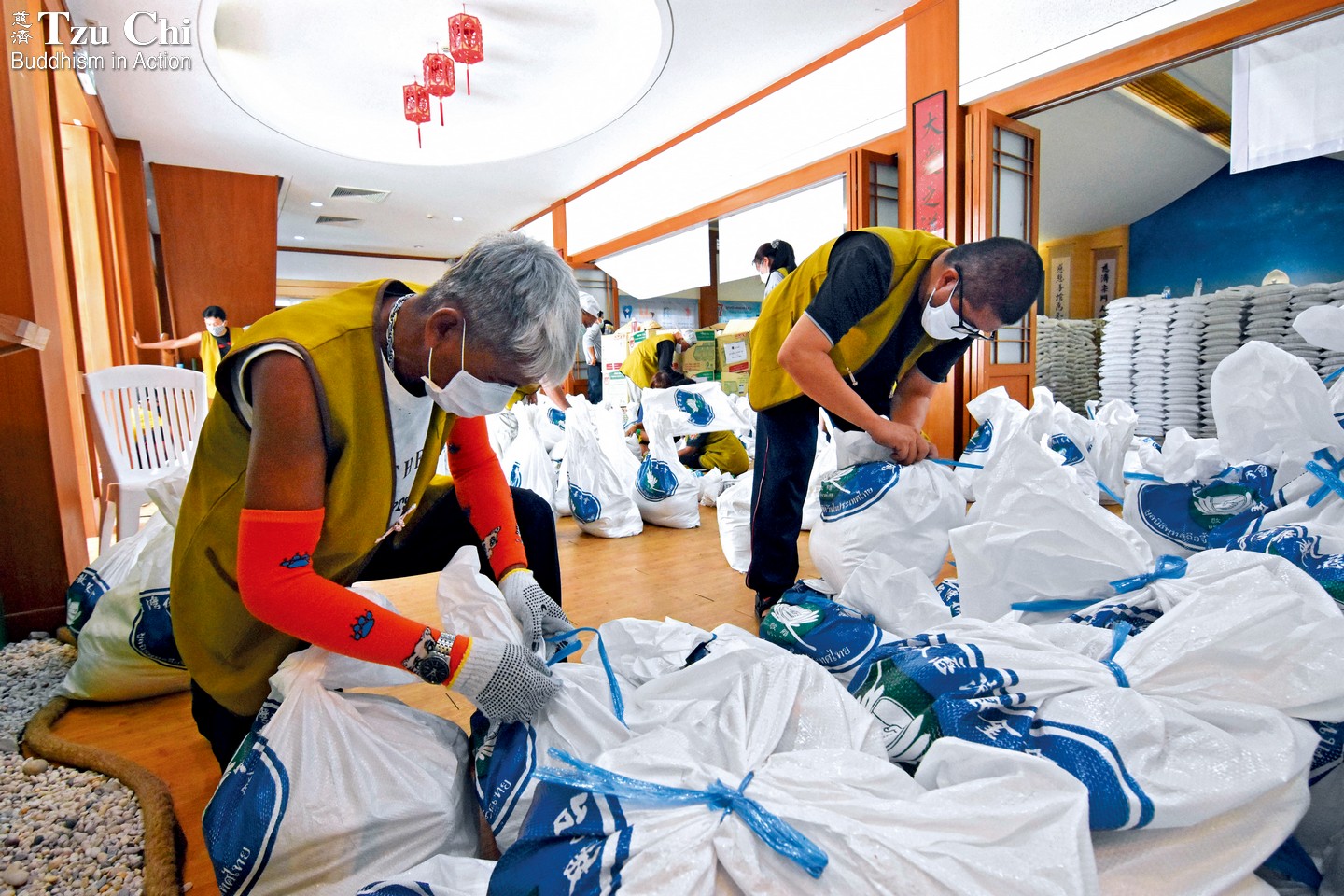
Volunteers pack goods to be distributed to people whose livelihoods have been seriously affected by the pandemic.

